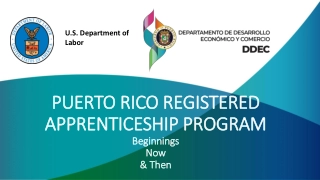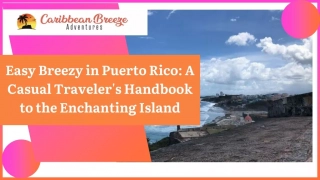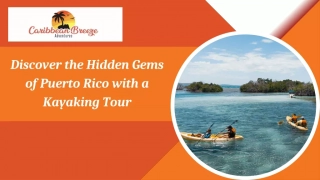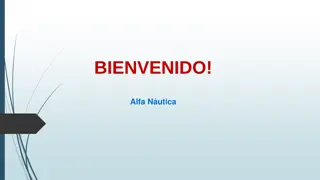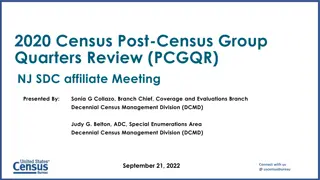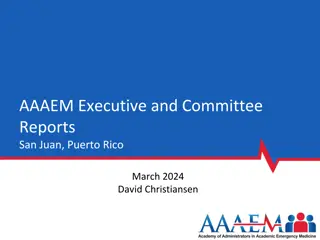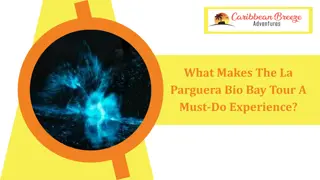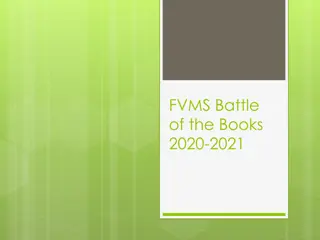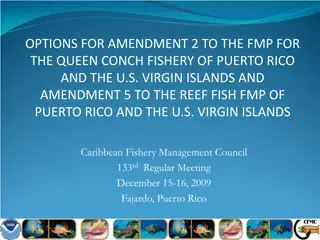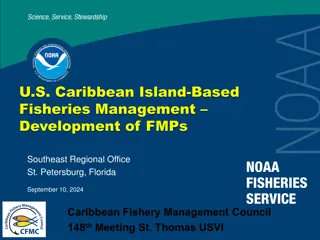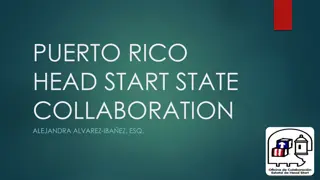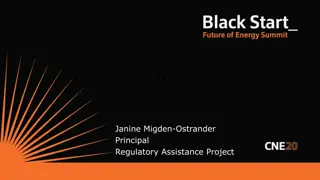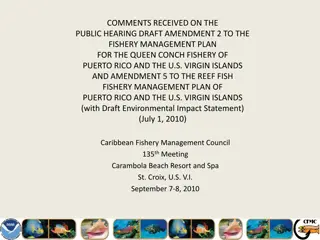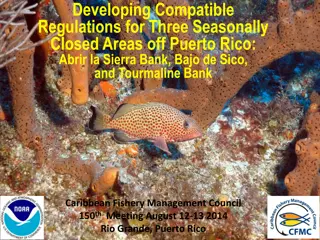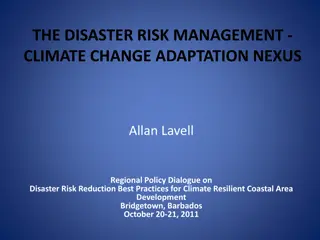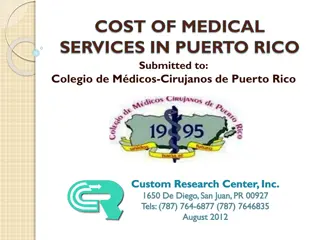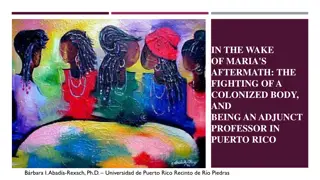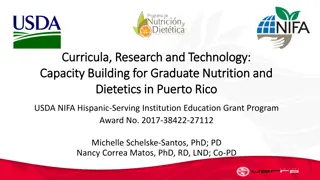Insight on Puerto Rico's Economic Challenges
Puerto Rico has faced significant economic challenges, including defaulting on its public debt, long-standing recession, and high poverty levels post-natural disasters. The island's economic struggles, fiscal deficit, and high cost of living are exacerbated by factors like emigration and the Covid-19 pandemic, impacting its path to recovery and overall financial stability.
Download Presentation

Please find below an Image/Link to download the presentation.
The content on the website is provided AS IS for your information and personal use only. It may not be sold, licensed, or shared on other websites without obtaining consent from the author.If you encounter any issues during the download, it is possible that the publisher has removed the file from their server.
You are allowed to download the files provided on this website for personal or commercial use, subject to the condition that they are used lawfully. All files are the property of their respective owners.
The content on the website is provided AS IS for your information and personal use only. It may not be sold, licensed, or shared on other websites without obtaining consent from the author.
E N D
Presentation Transcript
S SP PE EC CI IA AL L P PR RE ES SE EN NT TA AT TI IO ON N F FO OR R T TH HE E S SA AN N J JU UA AN N R RO OT TA AR RY Y C CL LU UB B BY: JOS R. GONZ LEZ IRIZARRY
I. BASIC ECONOMIC, SOCIAL AND LEGAL FACTS A. Social and Economic Facts. In 2015 Puerto Ricodefaulted on its public debt. By 2016 Puerto Ricowas in its tenthyearof recession. Puerto Rico, and several of its public corporations, are under the control of a Fiscal Oversight Board (the Oversight Board ) created under the Puerto Rico Oversight, Management, and Economic Stability Act ( PROMESA ) enacted in June 30, 2016. The Oversight Board was tasked to attend the restructuring of $72 billion in public debt, the existing unfunded public pensions of more than $50 billion, promote economic development, approve critical infrastructure projects, and provide the conditions to allow the return of Puerto Rico to public markets. 2
As recently reported in Puerto Ricos 2017 Financial Statements, Puerto Rico had an accumulated deficit of $71 billion, almost one (1) billion more than the previous year. But Puerto Rico s Gross National Product ( GNP ) was $70.1 billion. To date, the economic condition of Puerto Rico has not improved, as it has been adversely affected by a continuing depression, two hurricanes, earthquakes, emigration, the Covid-19 Pandemic, unemployment, and delays in receipt of appropriations of federal assistance. Only 40% of Puerto Ricans participate in the formal economy, as compared to 62% in the U.S., and a whole 30% of those who participate work for the government. 3
After Hurricane Mara, at least 50% of Puerto Rico inhabitants and 83% of children live below the Federal Poverty Level (Individuals: $12,760 and Family of 5: $30,680) compared with 15.1% for the U.S.; 19.7% for Mississippi, 19.5% for New Mexico, 18.6% for Louisiana, 17.8% for West Virginia, 17.2% for Arkansas, 16.9% for Kentucky, 16.8% for Alabama, 16.2 for D.C., 15.6 for Oklahoma, 13.6% for New York, 13.6% for Florida, 9% for Maryland, 8.8% for Hawaii, and 8.8% for New Hampshire; as to the other U.S. territories, 65% for American Samoa, 52% for the Northern Mariana Islands, 23% for Guam, and 28.9% for the U.S. Virgin Islands; and as to independent countries, 59.3% for Guatemala; 58.5% for Haiti; 46.2% for Mexico; 38.6% for Bolivia, 32.7 for El Salvador; 30.5% for the Dominican Republic; 29.6% Nicaragua; 29.6% for Honduras; 28% for Colombia, 25.7% for Argentina, 23% for Panama; 23% for Mexico, 22.7% for Peru, 22.2% for Paraguay, 21.7% for Costa Rica, 21.5% for Ecuador; 17.1% for Jamaica; 14.4% for Chile, 11% for Bermuda, 9.7% for Uruguay, 9.3% for The Bahamas, and 4.2% for Brazil. 4
Puerto Rico is the 3rd most expensive country in Latin America (3 out of 16); the cost of living in Puerto Rico is more expensive than in 60% of countries in the World (33 out of 81); and the cost of living in San Juan is more expensive than in 34% cities (72 out of 209). In Puerto Rico, a single person s estimated monthly costs are $1,784 and $3,433 for a family of four (4). Estimates of losses due to theft and corruption is in the billions. It is estimated that Puerto Rico losses $8 billion annually on available federal funds that are not requested. Eighty-Five percent (85%) of food staples are imported . 5
Federal Maritime laws create additional costs for products imported to Puerto Rico from U.S. ports which are 151% higher compared to cargo transported from Cartagena, Colombia, or Panama. B. The legal relationship of Puerto Rico and the United States is summarized below. Since 1898 Puerto Rico is a non-incorporated territory of the United States. Puerto Rico belongs to, but is not part of, the United States. The U.S. Constitution is not applicable, per se, to Puerto Rico, except for fundamental rights recognized by the federal courts. 6
Puerto Rico is subject to the plenary and exclusive power of Congress. Puerto Ricans are American citizens since 1917, but, up- to-date, that concession has changed none of the above tenets regarding the legal relation of Puerto Rico with the United States. Congress is recognized broad discretion in connection with social and economic laws provided that rational grounds support such laws. 7
II.DISCRIMINATIONAGAINST PUERTO RICOIN MANY FEDERAL ASSISTANCE PROGRAMS A. How? By excluding Puerto Rico; By rules or formulas different from the states and the District of Columbia or even other U.S. territories; By capping benefits. B. Justification Grounds Created by the U.S. Supreme Court in 1978 and 1980. Puerto Rico American citizens generally do not pay federal income taxes. It would be too costly for the U.S. Treasury to extend all such programs to Puerto Rico; and Extending such programs would be disruptive for the Puerto Rico economy. 8
III. THE BREAKING GROUNDS FEDERAL CASES A. Consejo de Salud Playa de Ponce v. Rull n, 586 F. Supp. 2d 22 (D.P.R. 2008). Judge Gustavo A. Gelp ruled that Puerto Rico had been assimilated to the U.S. and had become an incorporated territory where the Federal Constitution fully applies. The ruling was not appealed and the incoming Puerto Rico government opted not to pursue the remedies granted or that would have allowed greater benefits under certain programs. 9
B. United States v. Vaello-Madero, 956 F.3d 12 (1st. Cir., Apr. 10, 2020); 356 F. Supp. 3d 208 (D.P.R. 2019). Judge Gustavo A. Gelp at the District Court level and Judge Juan A. Torruella, in an unanimous First Circuit Opinion, decided that the Supplemental Security Income ( SSI ) program, that provides for extra income for the elderly, blind or disabled and which is not applicable to Puerto Rico since its inception, was unconstitutional as it violated the Equal Protection Clause of the U.S. Constitution. The essential grounds ruled upon by the courts were that the three (3) federal grounds for exclusion were no longer true, correct nor applicable, at least as of this date, and thus, Congress had no rational grounds to support its inapplicability to Puerto Rico. However, the Federal Government, last Friday, filed a Petition for Certiorari before the U.S. Supreme Court wherein it essentially insists that the inapplicability of the SSI to Puerto Rico is justified upon the traditional criteria and it adds a new one: 10
Congress has a legitimate intent in avoiding a one- sided fiscal relationship under which Puerto Rico shares the financial benefits, but not the financial burdens, of statehood and declining to include Puerto Rico in the SSI program is a rational means of further- ing that intent. A decision by the U.S. Supreme Court could be handed shortly, if it decides not to review the case, or in two (2) years, if it decides to review it, with the benefit of briefs from all interested parties. 11
IV. THE CONCERNS, PARTICULAR CALLINGOF CERTAIN PUERTO RICAN U.S. CITIZEN THE INITIATIVE, AND A If Puerto Ricans are U.S. citizens since 1917, we should not be treated differently from U.S. citizens residing in the continental U.S. The majority of Puerto Ricans are and have always been in dire economic needs that should entitle them to economic, housing, legal, and social benefits in equal terms and conditions as all other U.S. citizens. The majority of Puerto Ricans, even under the Internal Revenue Code, would not pass the income threshold to pay federal income taxes. 12
All working Puerto Ricans do pay payroll, Medicare, FICA and related taxes in equal terms with al other taxpayers. Moreover, Puerto Ricans do pay federal taxes from all income from U.S. sources. As Judge Torruella clearly reported that Puerto Rico have consistently paid taxes in higher amounts than at least six states, as well as the territory of the Northern Mariana Islands. This is unfair and I will do something about it! And he did it! 13
V. THE PEA MARTNEZETAL. V. U.S. DEPARTMENTOF HEALTHAND HUMAN SERVICES, CASE 3:18-CV- 01206-WGY, AUG. 3, 2020. Programs that discriminate against U.S. citizens residing in Puerto Rico were researched, studied and analyzed, together with several other articles, opinions and studies from top and experienced attorneys, economists, historians and other consultants. As a result, it was concluded that the Supplemental Nutrition Program ( SNAP ), formerly known as the Food Stamps Program, and the Medicare Part D Low-Income Subsidy ( LIS ), which helps cover the cost of a prescription drug plan, were ripe for constitutional challenge as the fiscal impact upon Puerto Rico would be significant and was clearly discriminatory. 14
A case was filed on April 13, 2018 with the U.S. District Court of Puerto Rico and assigned to the Hon. William A. Young of the District of Massachusetts, challenging the SSI, SNAP and LIS programs. After extensive briefing by the parties and several Amici, including MIDA, Congresswoman Nydia Vel zquez and the Yale Civil Law Clinic, among others, Judge Young issued a ruling essentially deciding that: Plaintiffs are poor U.S. citizens that would qualify for at least one of the programs, except that the programs excluded them because they lived in Puerto Rico. The Federal Government traditional grounds for excluding Puerto Ricans were not rational, were unconstitutional; a breach of our American ideal of fairness. 15
In light of the above, the Court provided the following remedies: It is unconstitutional to deny the plaintiffs, as well as all other otherwise eligible individuals, benefits under SSI, SNAP and LIS solely due to their residing in Puerto Rico. The Federal Government is enjoined from enforcing those unconstitutional provisions. The Court stays until October 1, 2020 its injunction against the Federal Government, except as to the plaintiffs in the case. 16
VI. DISCUSSION SCENARIOSFORTHE MIDDLEAND LONG-TERM OTHER PROBABLE DEVELOPMENTS. VII. QUESTIONS, COMMENTSAND REACTIONS. 17


